Gill James's Blog, page 20
March 14, 2018
An Interview with Mandy Huggins
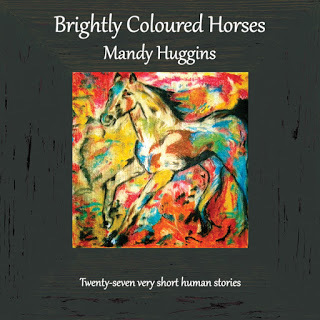
Today I welcome to my blog Mandy Huggins whose lovely collection Brightly Coloured Horses we have recently published through our Chapletown imprint.
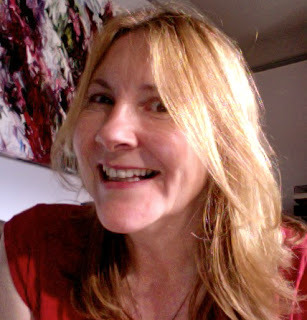 What made you become a writer in the first place? I inherited a love of travel from my parents, so as well as being a fiction author, I’m a keen travel writer.
What made you become a writer in the first place? I inherited a love of travel from my parents, so as well as being a fiction author, I’m a keen travel writer. What sort of things do you write? My first writing success was winning third prize in the school literary competition when I was eleven, with a love poem about George Best! I’ve written stories and poetry for as long as I can remember, but I only started writing seriously a few years ago. My partner was tired of me telling him I was a writer when I didn’t write anything, so he bought me a laptop for my birthday to quash all my excuses for not getting on with it! The first pieces I wrote were for specific competitions, as I found the deadlines were a useful incentive. I sent a travel piece to the Daily Telegraph every single week until they published me!
Do you have a writng routine?I have a full-time day job in engineering, so I write in the evenings and at weekends. My partner writes too - a very popular niche music blog - so we both understand each other’s need for creative space!
Do you have a dedicated writing space? Yes, I do, but I don’t have an office, or even a desk. I sit by the window in my living room and write with my laptop on my knee. All my notebooks and writing books are stashed away in a big wicker box at the side of me. If I think of ideas while at the day job, I scribble them on post-its, which live tucked away inside my laptop until I’ve acted on them. And I carry a tiny Smythson notebook in my handbag at all other times.
When did you first start calling yourself a writer? Do you in fact call yourself a writer? I think I decided I could call myself a writer when I was first published. It’s a thorny subject this one! I have had many spats on social media with people who think that if you have a day job then you’re not a writer - you’re a ‘hobby writer’. However, I need to eat as well as write! If someone asks me what I do, my answer is, ‘I work in engineering, and I’m also an author.’
Are your friends and family supportive? Friends and family are supportive - but non-writing friends don’t always understand why I can’t give up the day job and ‘just write’! And recently, when I’ve been promoting my flash fiction collection, Brightly Coloured Horses, I’ve become a little tired of male colleagues and acquaintances saying, ‘I’m sure my wife would love a copy.’ Grrrrr.
What makes you proud? I'm very proud that I will have two books published this year. As well as Brightly Coloured Horses, my first full length short story collection, Separated From the Sea, will be published this year by Retreat West Books, I would love to write a literary novel or a full length travel book, but my writing time is limited, and I can’t seem to give up the buzz of writing short fiction and travel pieces.
Which writers influence you? My fiction is influenced and inspired by many of the great writers that I love - such as Yoko Ogawa, Helen Dunmore, Ernest Hemingway, Richard Ford, A L Kennedy, Helen Simpson, John Steinbeck, Tessa Hadley, Patti Smith, Colm Toibin, A M Homes, Kazuo Ishiguro - the list is endless!
There are many books I would love to have written, such as The Siege by Helen Dunmore, The Housekeeper & the Professor by Yoko Ogawa, The Old Man and the Sea by Hemingway, or the wonderful Jane Eyre. But the one that stands out for me is The Remains of the Day by Kazuo Ishiguro. I love all his books, but this is my favourite. It is so beautifully written. A story of a life lost to duty; unsentimental and utterly heartbreaking. A masterpiece.
Published on March 14, 2018 09:12
Today I welcome to my blog Mandy Huggins whose lovely col...

Today I welcome to my blog Mandy Huggins whose lovely collection Brightly Coloured Horses we have recently published through our Chapletown imprint.
 What made you become a writer in the first place? I inherited a love of travel from my parents, so as well as being a fiction author, I’m a keen travel writer.
What made you become a writer in the first place? I inherited a love of travel from my parents, so as well as being a fiction author, I’m a keen travel writer. What sort of things do you write? My first writing success was winning third prize in the school literary competition when I was eleven, with a love poem about George Best! I’ve written stories and poetry for as long as I can remember, but I only started writing seriously a few years ago. My partner was tired of me telling him I was a writer when I didn’t write anything, so he bought me a laptop for my birthday to quash all my excuses for not getting on with it! The first pieces I wrote were for specific competitions, as I found the deadlines were a useful incentive. I sent a travel piece to the Daily Telegraph every single week until they published me!
Do you have a writng routine?I have a full-time day job in engineering, so I write in the evenings and at weekends. My partner writes too - a very popular niche music blog - so we both understand each other’s need for creative space!
Do you have a dedicated writing space? Yes, I do, but I don’t have an office, or even a desk. I sit by the window in my living room and write with my laptop on my knee. All my notebooks and writing books are stashed away in a big wicker box at the side of me. If I think of ideas while at the day job, I scribble them on post-its, which live tucked away inside my laptop until I’ve acted on them. And I carry a tiny Smythson notebook in my handbag at all other times.
When did you first start calling yourself a writer? Do you in fact call yourself a writer? I think I decided I could call myself a writer when I was first published. It’s a thorny subject this one! I have had many spats on social media with people who think that if you have a day job then you’re not a writer - you’re a ‘hobby writer’. However, I need to eat as well as write! If someone asks me what I do, my answer is, ‘I work in engineering, and I’m also an author.’
Are your friends and family supportive? Friends and family are supportive - but non-writing friends don’t always understand why I can’t give up the day job and ‘just write’! And recently, when I’ve been promoting my flash fiction collection, Brightly Coloured Horses, I’ve become a little tired of male colleagues and acquaintances saying, ‘I’m sure my wife would love a copy.’ Grrrrr.
What makes you proud? I'm very proud that I will have two books published this year. As well as Brightly Coloured Horses, my first full length short story collection, Separated From the Sea, will be published this year by Retreat West Books, I would love to write a literary novel or a full length travel book, but my writing time is limited, and I can’t seem to give up the buzz of writing short fiction and travel pieces.
Which writers influence you? My fiction is influenced and inspired by many of the great writers that I love - such as Yoko Ogawa, Helen Dunmore, Ernest Hemingway, Richard Ford, A L Kennedy, Helen Simpson, John Steinbeck, Tessa Hadley, Patti Smith, Colm Toibin, A M Homes, Kazuo Ishiguro - the list is endless!
There are many books I would love to have written, such as The Siege by Helen Dunmore, The Housekeeper & the Professor by Yoko Ogawa, The Old Man and the Sea by Hemingway, or the wonderful Jane Eyre. But the one that stands out for me is The Remains of the Day by Kazuo Ishiguro. I love all his books, but this is my favourite. It is so beautifully written. A story of a life lost to duty; unsentimental and utterly heartbreaking. A masterpiece.
Published on March 14, 2018 09:12
March 12, 2018
An interview with Linda Flynn
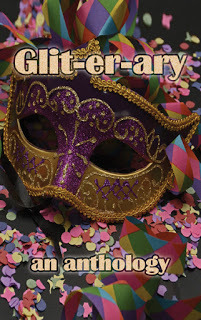 I have known Linda for quite a few years now and she has appeared in several of our anthologies, including the latest Bridge House one, Glit-er-ary. I'm delighted to welcome her to my blog today.
I have known Linda for quite a few years now and she has appeared in several of our anthologies, including the latest Bridge House one, Glit-er-ary. I'm delighted to welcome her to my blog today.What do you write? Why this in particular?I have had two children’s and one book for teenagers published. In addition I have had eleven short stories (for adults, children and young adults,) as well as a number of newspaper and magazine articles printed. I read books for all age groups and genres. The joy of writing short stories is that I can experiment with different styles. I really appreciate publishing companies like Bridge House who provide writing opportunities and who know their craft as they are run by writers. What got you started on writing in the first place?I can’t really remember a time when I didn’t write. As a child I used to love making up stories.My first writing commission was for six educational books with the Heinemann Fiction Project.
Do you have a particular routine? No, but I really should. When I get caught up in an idea it keeps playing on my mind until I write it down. Sometimes this can be quite late at night. Do you have a dedicated working space?No, it tends to be anywhere and everywhere. Sometimes I work on an idea when I’m walking my dog and then I wish I had a notebook with me, other times it can be when I am trying to sleep and I know I won’t settle until I write the gist of it down. Other times I will work on a chapter wherever I happen to be and I won’t stop until it’s finished. My favourite place to write is in Woolacombe, overlooking the sea. I find it soothing and a wonderful setting to tune into ideas. When did you decide you could call yourself a writer? Do you do that in fact?My mindset is one of a writer in that I am constantly conjuring up ideas for stories, or playing with rhythms or words. I don’t often call myself a writer though, as I don’t yet earn my living from my published work. How supportive are your friends and family? Do they understand what you're doing? My son has been brilliant; he created my website for me and helps with photos or technical issues. My daughter has also been very supportive and regularly buys me subscriptions to writing magazines. She writes and performs comedy pieces. Publishers, editors and agents have offered a lot of encouragement, which I have really appreciated What are you most proud of in your writing?There is a tremendous thrill when an offer of publication comes through for a book or a short story, there’s nothing like it! It’s also exciting to win a writing competition. It keeps the impetus going on the longer projects. Whenever I have finished a story though, I move on to my next idea and I lose myself in that.
How do you get on with editing and research? I have to hand-write my first draft which is a scrawl so that I can work really rapidly on my ideas, with plenty of alterations as I go. At this point I try to switch off my over critical inner editor. Later I type the chapters out more slowly, altering the text as I go. The editing is fairly swift afterwards. I enjoy the research that I need to do, but some books require very little. Do you have any goals for the future?My most immediate target is to complete a Young Adult book that I have been working on. Once it’s complete I should also be looking for a new agent as my previous one moved to New York. In the meantime I would like to continue writing short stories and to review my children’s books.
Which writers have inspired you? I love reading all kinds of stories for adults, children and YA; I feel humbled when I read so much brilliant fiction. There’s so much wonderful literature available, from the classics to amazing contemporary authors! Amongst my favourite short story writers are Kate Chopin, whose style is so concise and symbolic and Daphne du Maurier’s collections which effectively evoke atmosphere and tension. It’s important for me to have piles of books to move onto and I choose according to my mood. I don’t even have a favourite genre, but I will read my way through an author’s books if I love them.
Find out more about Linda at: www.lindaflynn.com
Published on March 12, 2018 10:23
March 8, 2018
Busy Doing Nothing
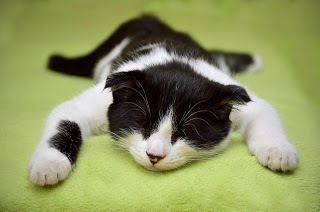
Writers need down time. You cannot churn out prose or poetry continuously. Yes, you need a routine, and yes you should write every day if possible, not just when the muse strikes you. But you must have some time to be nurtured.
I read once that Dickens used to write until 2. 00 .p.m., then go for a long walk. At 5 00 p.m. he would go to a local inn for a drink or two before either going home for dinner or eating with friends. I'm not sure whether this can be right since I've also read a biography of him that made him out to be an extremely busy man. But if that routine is correct, I envy him. It meant writing for six hours a day yet having plenty of time and opportunity to be sociable and to observe life.
The final session of my first semester on my MA course was spent at Winchester cathedral and then in the ancient pub behind it. We had been instructed to walk around the cathedral and speak to no one. We were not to have any preconceived ideas of what would happen. It was hard not to giggle when we saw one of our classmates but otherwise it worked. I began to see the cathedral as I'd never seen it before. And the lights outside. I experienced the rain on my skin as if I'd never felt it before. My first fiction assignment became a short story about a teenage alien coming to Winchester. It passed and it has since been published.
After our lecturers had gone from the pub, however, we spent some time discussing how bonkers they were.
A couple of years ago, at the end of a workshop module with my own Masters students, my colleague and I set a similar task at Media City UK, Salford Quays. It’s a quirky sort of place anyway. Our students were set off to roam for a couple of hours. We met up in one of the bars at the end of the evening. We could tell by the way that they looked at us that they thought we'd lost the plot as well. Yet they produced some excellent work and many of them referred to this event in their statement of poetics.
Those eureka and epiphany moments often come when we're busy doing almost nothing. Archimedes had his in the bath and Poincaré as he stepped on to a tourist bus. I find my brightest ideas often come when I'm ironing, walking, cooking, driving or swimming but I can always trace them back to a time when I was doing absolutely nothing.
I love to go into town on the tram. I rarely look at my phone or try to read. I don't deliberately look for ideas but plenty come from my people-watching. You see, I am busy doing nothing.
Published on March 08, 2018 01:12
March 7, 2018
Interview with Helen Laycock
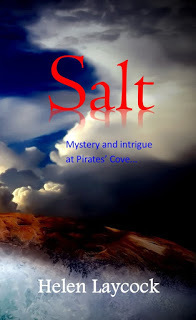
Today I interview Heled Laycock. Helen is a frequent contributor to CafeLit and is a prolific writer. Over the next few weeks I'll be featuring some of her books. 1. What do you write? Why this in particular?I don’t fit very neatly into a writing niche (#rebel) which is a shame (I like making lists and designating categories)! In ascending size order (as I’m a bit OCD), I write flash fiction, serious and humorous poetry (for children and adults), short stories (again for children and adults), plays (more rarely) and children’s fiction up to about 40 000 words.When I am inspired, I write, whatever the form.
2. What got you started on writing in the first place?As with most writers, I started as a child. Reading books and writing stories was my favourite thing in the world! I would get lost in them. I didn’t know if I was any good at writing until I started to get feedback from teachers at secondary school. By then, I had started writing poetry, too. I was encouraged to have my writing published in the school magazine, I also found myself winning school-based competitions and by the sixth form I had put together a folder of all my writing which my English teacher showed to an English professor; he sent back a detailed report which glowed with positivity and I thought, ‘I can do this!’When I became a teacher, I adored teaching creative writing. It rekindled my own passion for exploring language and ideas. It was during my second teaching post that I wrote my first children’s book ‘Charlie Chumpkins’. The children had been writing poetry about what the world would be like if they were tiny, and that sparked off the idea. I had never imagined that I would be able to sustain the process of writing longer fiction, but this was an easy way in as each chapter focussed on a different adventure, so it was like producing a series of stories.After this, though, I got the bug. I gave up teaching and went on to write several more children’s books with more complex structures, as well as other forms of writing. I began to get poetry, flash and short stories published in magazines and anthologies. I also had a few near misses from traditional publishers with my children’s books.
3. Do you have a particular routine?I am definitely better at writing in the morning, but when I am writing a book, time ceases to be, and I can find myself tap-tapping away until the early hours. I keep a notebook beside me where I scribble new ideas as they come to me – plot points, twists and details which will need to be included somewhere, but if I’m in the middle of a gripping scenario, I can’t stop until it’s finished.I like to finish the first draft of short stories and poetry in one go. Afterwards, I will tweak and tweak until I feel I have done all that I can. This is especially true of poetry. I think it’s a beautiful art form with so many elements working together, both in language and structure. I will spend much longer perfecting a poem than a story.4. Do you have a dedicated working space?Absolutely! I have a fantasy about being one of these writers who sits typing in a coffee shop all day, swathed in velvet and wearing a jaunty hat and quirky scarf… but I can only work in my study. The chair is the right height and provides the right level of comfort. Everything I need is around me, and the screen in huge which means I can look at two A4 pages side by side.5. When did you decide you could call yourself a writer? Do you do that in fact?Despite now having a catalogue of published work, I have never been comfortable calling myself a writer. I always dilute it (and trivialise it?) a bit by saying ‘I write’. However, I just have secured myself a writing job (Hooray!), and because it is paid work, I have now given myself permission to say those words (I think). I haven’t tried it yet…6. How supportive are your friends and family? Do they understand what you're doing?It’s not really something I talk about with friends. It seems a bit embarrassing, as though if I mention it, I expect them to read my stuff! I don’t think non-writers really understand about the road to publication, what editing is, or how important promotion is. I don’t even think they consider me a ‘real’ writer!I sometimes inflict a funny poem upon my husband – and get annoyed if he doesn’t roll about laughing, choosing instead to question a ‘fact’! My uncle writes, so it’s good to share news with him. It was great having two daughters to read to in instalments as I wrote my children’s books. They still make the right noises when I tell them about a writing achievement, even if they are more interested in listening to Spotify!What I have found great is being a member of an online writing forum. Other writers really ‘get it’ – the disappointments, the necessity of finding the right word or punctuation, the joy of acknowledgement – and they are always very generous with their praise when reading my writing, or when there is good news, plus they are a great resource themselves.
7. What are you most proud of in your writing?Lots of things! My first competition win, for example, for a poem in 2005, my first inclusion in an anthology, my wealth of written material. I feel a great sense of achievement at having created believable fictional worlds in whichever genre. Writing something good is like finding a unique recipe using totally new ingredients. The taste test is putting it ‘out there’, offering it to strangers and waiting for a reaction. A high point for all writers is finding a wonderful review* or feedback from a publisher. It means so, so much. *I wish I had more reviews!!8. How do you get on with editing and research?I love editing. First, I get it all down in a great big whoosh. I am as careful as I can be not to make mistakes as I write, but, of course, I always edit afterwards. It’s therapeutic and rewarding to find mistakes (I feel like a detective!), or to be hit by a flash of inspiration as to how something could be improved. I choose an element to edit and only work on that, like typing in time clauses so I can check the subsequent comma, for example, or looking at spacing. I use the highlighting function a lot in Word so that I can quickly locate areas where I want to change something, or I will write something in red if it’s a hint to be pursued elsewhere in the story. I made a big chart for my last book as there were lots of characters and storylines which needed continuity within a time frame.In a long piece, I will edit as soon as I have written a complete section, but I lose track of the number of times I go through everything with a fine toothcomb.I don’t find research too onerous; I don’t write historical or highly factual fiction. If I am aiming for realism, I’ll Google things. For example, in ‘Mandrake’s Plot’, a children’s boarding school mystery set in the Scottish Highlands, I had to find out about local plants. For ‘Glass Dreams’, a circus mystery, among other things, I re-read Enid Blyton’s (dreadful) Mr Galliano’s Circus. ‘Salt’ is set at a fictional Cornish town, so, naturally, we had to take a Cornish holiday! The memories and photos proved very useful in creating the backdrop to the mystery.
9. Do you have any goals for the future?I have short term goals – a list of writing and submission opportunities. I used to enter competitions, so I’d like to get back into that. I have a newly-finished humorous children’s book which I’d love to get traditionally published. And I’d generally love to be better known as a writer. This week I read a review which said, ‘Helen Laycock is one of my favourite children’s authors’ and last year, when I ordered a piece of artwork as a gift, the artist wrote, ‘I know your name. Are you an author? I think I’ve read one of your books.’ It doesn’t get much better than that!10. Which writers have inspired you?I’d love to write thrillers like Linwood Barclay or Tess Gerritsen. I started one and have a few ideas for others, but, so far, I have put them on the backburner. I think Roald Dahl was a wonderful children’s author (and now, in a similar vein, Julian Clary and David Walliams) but our writing styles are different. The only book of mine which nods in a slightly similar direction is ‘Martha and Mitch’, where some of the characters are larger than life. Probably my biggest influence was Enid Blyton. That sense of adventure which child protagonists experience during freedom from adults has stayed with me.
Published on March 07, 2018 09:45
March 5, 2018
Interview with Anusha
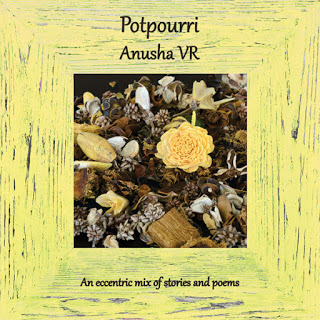
We have been privileged to publish Anusha's Potpourri, so I've invited her on to my blog in order to get to know her a little better.
What do you write? Why this in particular?
I have an affinity towards flash fiction and short stories as they manage to capture a myriad of themes in very few words. Off-late, I have been trying my hand at poetry as well. As far as genres go, I have no preferences. I write in any genre that strikes my fancy.
What got you started on writing in the first place?I have always found solace in books. As a child, I remember my aunt reading bed time stories to me. Soon I started making up tiny stories of my own to share with her. She would listen to all my far-fetched stories with the utmost patience. So I credit my entire writing career to her.
Do you have a particular routine?I don’t have the luxury of sitting down at a designated hour to write because of my hectic work hours. All of my writing happens when I am commuting to work. As far as my “to-read” list goes, I catch up on reading in airports or when I am on vacation.
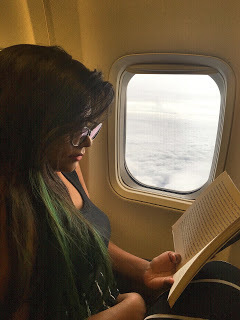
When did you decide you could call yourself a writer? Do you do that in fact?On most days, I describe myself as a corporate sellout. I had never really given much thought to getting my work published. I scribbled in notebooks just so that I could put all the thoughts swimming in my head onto paper. But when I was 19 I sent out a short story and to my surprise it got picked up for publication which encouraged me to send more of my work out into the world. Over the past two years I have contributed to around thirty anthologies. Yet, I am not comfortable calling myself a writer as I feel I have a long way to go.
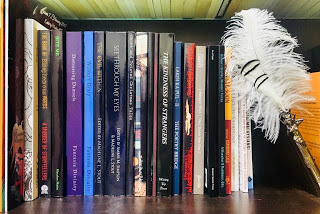
How supportive are your friends and family? Do they understand what you're doing?I have an incredibly supportive family and for that I am grateful. My mum is the first to read all of my published pieces and the first to give a completely biased and glowing review. My father is extremely proud of me but he has read only couple of my short stories since he prefers political editorials which in turn I loathe. My friends on the other hand always have an undercurrent of bitterness running through their facade of niceties.
What are you most proud of in your writing?I am never truly content with what I write but there are two pieces of my work I am proud of. One is a short story titled a Bloody Miracle (published in a “Book of Blasphemous Words” by A Murder of Storytellers) and the other one is a spoken word piece called “Closet Feminism” I have performed a couple of times in Kuala Lumpur and Bangalore.
Do you have any goals for the future?Despite the time constraints I currently face, I have managed to pen two chapbooks this year - Potpourri (Chapeltown Books, 2018) and Rotting Fruit (slated for publication by Writing Knights Press). I hope next year I will be able to carve out time to work on a full length novel.
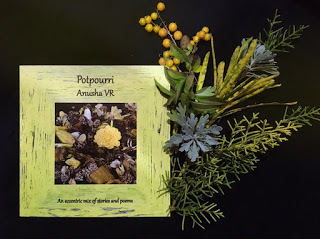
Which writers have inspired you? I picked up Rebecca at a school book fair in the 7th grade and ever since then I have been devoted to Daphne du Maurier’s works. Emily Bronte, Margaret Mitchell, Joanne Harris, Ruskin Bond and Khaled Hosseini also rank as my all time favorites.
Facebook: https://www.facebook.com/anusha.vr.1?ref=br_rsGoodreads: https://www.goodreads.com/author/show/16083517.Anusha_V_R_
Published on March 05, 2018 07:46
March 3, 2018
Newsletter 3 March 2018
 News about my writing Scrivener is continuing to be really helpful and I'm learning more and more of its useful little tricks. It's certainly very effective for planning and keeping tabs on content. I have yet to sort the formatting out. Case in point is The House of Clementine. It's still possibly the most difficult thing I've ever written. Now, though, I've added in two more strands and think I can plan the rest of the story out easily. I've finished the end of the play script of The House on Schellberg Street. I now have two groups lined up to read it. I'm going to organise two or three other readings. If you'd like to be involved and you live within commuting distance of greater Manchester, let me know. My book on marketing is out there. You can find it here. Remember, if you're published by Chapeltown, CafeLit, Bridge House or The Red Telephone, this is free of charge to you. If you've not managed to download your free copy, please contact me. Amazon has approved our recoding of January Stones and this is available as an audio book. You can find it here. I notice you can take a free trial with audio books but I feel a little wary of this, though I am tempted. The audio book represents just one of my current experiments. I'm also reediting a group of my short stories. I hesitated about packing my stories into themed volumes or mixing them up. I've settled on themes though I'm still uncertain. Anyway, I'm trying out Draft to Digital, who will publish it in all e-book formats and also provide the PDF needed by Lightning Source. If I'm pleased with the results I may roll this out to the imprints.
News about my writing Scrivener is continuing to be really helpful and I'm learning more and more of its useful little tricks. It's certainly very effective for planning and keeping tabs on content. I have yet to sort the formatting out. Case in point is The House of Clementine. It's still possibly the most difficult thing I've ever written. Now, though, I've added in two more strands and think I can plan the rest of the story out easily. I've finished the end of the play script of The House on Schellberg Street. I now have two groups lined up to read it. I'm going to organise two or three other readings. If you'd like to be involved and you live within commuting distance of greater Manchester, let me know. My book on marketing is out there. You can find it here. Remember, if you're published by Chapeltown, CafeLit, Bridge House or The Red Telephone, this is free of charge to you. If you've not managed to download your free copy, please contact me. Amazon has approved our recoding of January Stones and this is available as an audio book. You can find it here. I notice you can take a free trial with audio books but I feel a little wary of this, though I am tempted. The audio book represents just one of my current experiments. I'm also reediting a group of my short stories. I hesitated about packing my stories into themed volumes or mixing them up. I've settled on themes though I'm still uncertain. Anyway, I'm trying out Draft to Digital, who will publish it in all e-book formats and also provide the PDF needed by Lightning Source. If I'm pleased with the results I may roll this out to the imprints. 1940s Group I'm beginning to find out more and more about 1940s events up and down the country. I wish I could go to them all! I'm hoping though, that we might get a good representation of members at most of them and that we can share information that way. Do join us if you think this is for you. Importantly, I'm happy for you to promote your books here on the last day of the month. Here's the reminder of what it's all about: This is a Facebook group for all people who write about the 1940s. Fiction and non-fiction, for young and old. Topics might then be: the Holocaust, World War II, Civilian Experience (all sides) and the battle front. We can exchange ideas about research and marketing. We may promote books and stories, - the last day of every month and on launch / release day. If you feel that is you, do join us: https://www.facebook.com/groups/2026868870924138/ Dreamteam The Dream Team continues to grow. Find members here. This is a personal recommendation. Initially I intend to use my Dream Team a lot myself but gradually I would add in people that friends and friends of friends have recommended. What happens? You sign up to a mailing list and every time a request comes in we mail it out to you or the enquirer contacts you directly via my web site. The conversation then carries on between you and the person making the request. You may also have a page set up on my blog and you may update that once a year. Interested? You may sign up for more than one category. Beta readers sign up here.Reviewers sign up here. Editors sign up here.Illustrators sign up here.Designers sign up here.Proof-readers sing up here. DO REMEMBER THAT AT ANY TIME YOU’RE APPROACHED AND YOU’RE BUSY IT’S PERFECTLY FINE TO SAY NO. Bridge House The theme of our 2018 is "Crackers". We don't mean just the Christmas sort. We're looking for stories that amuse, certainly, though. It would be good to have a few that give us great big belly laughs, but also welcome those that just make you smile. Another interpretation of "crackers" might be madness. So think Black Mirror, Inside Number 9, Kafka's Trial, Yes Minister, Yes Prime Minister, Catch 22. Got one of those in you? Give it a go! Full submission details here. We're also very privileged to be the publisher for the Waterloo festival. You can read details about it here. You can see how much we are involved with the festival here but do take a look at the other pages. We’re getting plenty of interest in our single-author collections. These are for authors we’ve published before and they may include stories we’ve already published, ones they’ve had published elsewhere and new ones. The description for this is now on the web site. We’ve already had some enquiries and we’re currently working on several anthologies. You may recycle stories we’ve already included in another anthology, and you may reedit these if you wish. You may also add in new stories. We’re aiming at a total word count of between 30,000 and 70,000 words. Dawn Knox's Extraordinary is now out. It is available here. If you’re interested in having a single author collection, contact me here. Also in progress are collections by Paul Bradley, Phyllis Burton, Jesse Falzoi, Jenny Palmer, Dianne Stadhams and Paul Williams. Several other Bridge House authors have applied and they're in a bit of a queue but I'm sure we'll accept them. After all we know them. CaféLit Stories are now all being posted at 4.00 p,m, Afternoon Teatime, Kaffee and Kuchen time and it's also when the kids are home from school. Just the right time for a cuppa and a good story. We're getting quite a few submissions and are pretty well on our target now of one a day. Sadly, of course, we have to reject some. InFebruary we've had stories from Carolyn Belcher, Debbie Boitoult, Liz Cox, Ann Dixon, Susan Eames, Alyson Faye, Robert Fergusson, Patricia Gallagher, Valerie Griffin, Kim Martins, James McEwan, Roger Noons, Penny Rogers and Kathy Sharp. We're always open to submissions. Find out to submit here. Remember, this gives you some exposure, you can add in a short CV each time, and there's always the chance that your work might be accepted for the annual anthology. The Best of CaféLit 6 has been produced and copies are on sale. As usual we welcome reviews. I can let you have a PDF or an e-mobi copy if you're willing to review. You can also buy copies here. I'll shortly be working on The Best of CaféLit 7. On offer for CaféLit authors is a page on our web site. See examples here. The list is growing. Click on the names to find out more about the authors and to access their work. If you're a CaféLit author and would like a web page, use the ones there to get ideas. You need to send me between 250 and 350 words about yourself, an attractive image, a list of up to six publications, up to six awards and up to six links. I then also link the page to your stories on CaféLit. Send to gill at cafelit dot co dot uk. If you already have page here, this is the time of year you may ask me to update it. You may have a new publication, award, web site or image that you'd like posting. Remember we keep up to six awards and publications on display.
ChapeltownI'm now trying to build up the Chapeltown readers list. I'm giving away a free copy of my January Stones 2013 to anyone who joins. See details here: http://www.chapeltownpublishing.uk/Spread the word. The profit share of the audio book for this title will equal 10% of the cover price. I'm now thinking of rolling that out to the other titles. We've continued to be busy. You can find details of our latest publications below. They are in our series of Flash Fiction collections and are both the little square books. We have: Brightly Coloured Horses by Mandy Huggins: http://www.chapeltownpublishing.uk/2018/02/brightly-coloured-horses-by-mandy.htmland Paisley Shirt by Gail Aldwin: http://www.chapeltownpublishing.uk/2018/02/paisley-shirt.html
If you're interested in reviewing any of the above, just email me and state whether you'd like the mobi-file or the PDF.
Chapeltown is now publishing all of The Schellberg Cycle. A new version of The House on Schellberg Street is now available. Details are here. The second story in the series will be out in March this year.
Creative CaféTwo cafés have been added this month: Octavo's Book Café and Wine Bar, Cardiff Bay: http://www.creativecafeproject.org/2018/02/octavos-book-cafe-and-wine-bar-cardiff.html The MAP Café , London: http://www.creativecafeproject.org/2018/02/map-cafe-london-nw.html Keep sending suggestions and review them if you can. I'm continuing my tour of creative cafés where I collect stories for an anthology. In some cases, writers may offer them and in others maybe customers may tell me their story and I'll write it for them. Do you know of a café that might be interested in this? Let me know if you do. Remember you can now buy merchandise for the Creative Café project. The profit on anything you buy here goes to the Creative Café Project. Check this out here. We’re always looking for new cafés. If you visit one of the cafés in the projectand would like to write a review of between 250 and 350 words – nice, too, to have a couple of pictures – send it to me here.Do the same if you find a new café. I’m also now proactively encouraging cafes to stock The Best of CaféLit. Do you know anyone who might like to stock it? We can offer a 35% discount to retailers. Query gill at cafelit dot co dot uk. The Red Telephone Our mentoring programme is now full. I’m working quite closely with three very different authors: Charlotte Comley, Dianne Stadhams, and Nina Wadcock. They are all presenting some fascinating material. University of Salford graduates Lauren Hopes and Christian Leah have also joined our happy band. I was delighted to see Lauren at our recent Celebration Event in London. She read from her novel. Facebook Group for the Imprints I've been toying with this for a while. One of our Chapeltown writers asked if we could form a group and this persuaded me that this was the right thing to do. I've spent the last twenty-four hours thinking of a name. I wanted something that sounded global and that implied something about the unique qualities of Bridge House, CafeLit, Chapeltown and The Red Telephone writers. Well, we've published Citizens of Nowhere, and we're pretty international. So, Sans Frontières sounds good. Martin, who does most of our design, came up with "Scribblers". Yes, it's a bit of a cliché but it alliterates nicely. So, that's what we've become. Note this is a secret group and you have to be invited to join. The public will not be able to see this. It is for writers published by one of the four imprints. Here you can:· Discuss all technical issues re our books· Exchange marketing ideas· Advertise and report on your events· Promote any of your titles or successes · Share good practice and ideas· Get help with writing problems · Anything else appropriate The page URL is https://www.facebook.com/groups/185719828704485/I've now started the process of inviting all of our writers.
Facebook CaféLit PageI also invite you to engage with the CafeLit page. I'm widening the scope of this to include all of the imprints. This is public facing and is more about promotion. Find it here: https://www.facebook.com/CaféLit-Writers-Creative-Café-Project-138022606266155
Book tours If you’re a Bridge House / Red Telephone / CaféLit / Chapeltown author and you want to get serious about book tours, consider our author’s kit. We provide twenty or so books (exact number is up for negotiation) you take to the bookshop and the bookshop can put these through the till. We then invoice the bookshop, with a 35% discount for any sold and top up your supply to twenty. At the end of the tour you can either pay for the remaining books at cost + 10% or keep them until you’ve sold them and then pay the normal price of 75% of RRP. The latter can in any case be set against royalties. You need to allow at least ten days between events. We must be able to invoice a retailer later for this to work. Contact me here if you’re interested in this.
School Visits I’m proactively promoting my school visits associated with The House on Schellberg Street project. I’ve now developed a whole workshop for this. It starts off with a board game, includes some role play and creative writing and ends with a discussion. It is now possible to purchase the kit to work on on your own. Find details here.I did a presentation about my work on this at the 2017 NAWE Conference. It became apparent as I talked and partly from the reaction of one of the delegates that the workshop has more impact than the book. Mind you, that had partly been the intention. Costs for my workshops = travel expenses plus £400 for a full day and £200 for a half day. This includes all materials and some freebies. Two schools near to each other might consider splitting the day and halving the travel expenses and fees. This is open to negotiation in any case. I also offer a free half day visit, though you pay my travel expenses, if you allow me to promote my books. I’m continuously adding materials for schools to the site that are different from the ones I use for the workshops. I’ve recently added in resources and books to do with the topic. See them here: Query for a school visit here.I’m also happy to tailor a visit for your agreed donation. This can be for either a Schellberg Cycle visit or a creative writing workshop. Any monies raised this way will go specifically to a project I have for a non-fiction book about a journey that will follow the footsteps of Clara Lehrs. I’m hoping to do the whole journey by train, including departing via my nearest Metrolink station. It’s important to feel the rails beneath my feet. I offer as well standard author visits which include readings from my books, Q & A sessions and creative writing exercises. Please remember, with these as well, I’m open to negotiation if you can’t afford the full price. Upcoming eventsMore specific details of the following will be posted later.I'm hoping to run a workshop on marketing for indie writers / publishers. This will be free of charge but you may make a donation if you wish. This will enable me to put on further events. A Pushing Boundaries, Flying Higher Master Class about writing the young adult novel.Manchester event in the summer.London event 1 December 2018 (Save the date!) Past eventsOur event on 2 December at the Princess of Wales went well though twenty delegates had to pull out, all for good reasons: illness, awkward trains, family problems, job inductions etc. and I too suffered from "awkward trains". At least though, I got all of my fare back and quite promptly. Nevertheless, we all had a great time. We also sold half of our stock of books within the first five minutes and quite a bit more later on. I didn't have to bring all that much back home. I actually managed to join in the "speed-dating" this time. The little bell that I bought worked really hard. She is a young woman in a crinoline dress. Esmeralda. It was good to put names to faces. I read a little too from January Stones. We also had readings from Margaret Bulleyment, Penny Dale, Shanta Everington, Lauren Hopes, Dawn Knox, Paula Readman, Allison Symes and Robin Wrigley. Writing opportunities Remember I keep a full list of vetted opportunities on my writing blog. See them here. New ones are added several times a day. Roughly once a month I go through it and take out all of the out of date ones. At that point I send it out to a list. If you would like to be on that list, sign up here. I have recently revamped the way this works and made it much more user friendly. Let me know what you think. Current reading recommendation This month I'm recommending Sunflowers in February by Phyllida Shrimpton This contains many of the elements we are used to seeing in young adult fiction: boy/girl relationships, peer pressure, concern about sexuality, an attitude towards alcohol, tension between young adults and parents. However, Phyllida Shrimpton brings in some other themes that lift this text out of the everyday by also showing us the life of twins and dealing with forgiveness. The text might be described as a paranormal story. This isn't a spoiler – the blurb already makes it clear that the story starts as Lily realises she has died. Shrimpton offers us a version of the afterlife that is palatable to the young adult reader. The story is told mainly from Lily's point of view, in a first person present tense narrative. This type of narrative helps to create an effective voice in young adult literature and indeed works well here. We're left with the impression that we are Lily's best friend, she is telling us exactly how it is and she hasn't yet quite rationalised what is happening. Occasionally we have the point of view of other characters in a close third person narrative. Shrimpton's prose is very effective yet does not detract from Lily's voice. The story arc is firm yet we cannot guess what the outcome will be. She provides plenty of tension and pace to keep us reading. The ending is left open, leaving the reader to decide what happens next. This too is very suitable for the target reader. Find it here.
Calling all writersI'm running an occasional series of interviews on my blog. Take a look at my interview with Allison Symes, Dawn KnoxGail Aldwin, Roger Noons, and Alyson Faye. If you would like to be on my blog just answer the questions below and send them with appropriate images to gill dot james at btinternet dot com. Please feel free to pick and choose which of these to answer. 1. What do you write? Why this in particular? 2. What got you started on writing in the first place?3. Do you have a particular routine? 4. Do you have a dedicated working space? 5. When did you decide you could call yourself a writer? Do you do that in fact? 6. How supportive are your friends and family? Do they understand what you're doing? 7. What are you most proud of in your writing? 8. How do you get on with editing and research?9. Do you have any goals for the future? 10. Which writers have inspired you?Please write as much or as little as you like for each section and supply as many pictures as you like. Also let me know your latest publication and supply me with a link if it's not on Amazon. I 'm also happy to offer you a post whenever you have a new book come out, even if I'm not your publisher. In this case answer the following questions:Tell me about your book. Tell us about your research for this book. What inspired you to write this? What's next? How can we get a copy of the book?Do you have any events planned?Again write as much or as little as you please. Alter and add to the questions if you wish. Provide as many pictures as you wish. Send to: gill dot james at btinternet dot com Giveaway This month I'm giving away Citizens of Nowhere You will also find in this dropbox:· An extract from Clara’s Story· Some seminars for schools about The House on Schellberg Street· Some fiction writing exercises· The opening chapters from my manual for writing the young adult novel Note, that normally my books and the books supplied by the imprints I manage, sell for anything form £0.99 to £10.99, with most on Kindle being about £2.99 and the average price for paperback being £7.00. We have to allow our writers to make a living. But we’re offering these free samples so that you can try before you buy. Naturally I welcome reviews.
Happy reading and writing.
Published on March 03, 2018 03:37
February 26, 2018
My new book on marketing
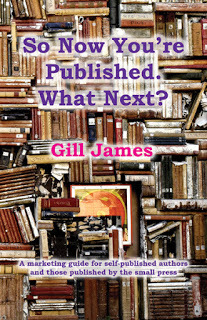 I'm not really claiming to be the world's expert on marketing. In fact I'm gradually working my way through a marketing course myself. However, as many of you know I also work as a publisher and an editor. I often find myself answering the same questions over and over and so I thought it rather a handy idea to put all of these ideas together in one book.
I'm not really claiming to be the world's expert on marketing. In fact I'm gradually working my way through a marketing course myself. However, as many of you know I also work as a publisher and an editor. I often find myself answering the same questions over and over and so I thought it rather a handy idea to put all of these ideas together in one book.This volume answers many of the questions that writers ask us about how they can help to promote their book and abut how much we can do to help. It covers such topics as:
blogsweb sitesgetting reviews press releases and advance author information working with the local press, radio, TV, local bookshops and other venues book launchesmaking a book trailer using social media other merchandise workign with schools, libraries and the Creative Cafe Project finding your fans and creating a mailing list professional bodies you should register with routines and checklists
Otherwise available on Amazon.
Published on February 26, 2018 12:59
February 21, 2018
The House on Schellberg Street – Edition 2
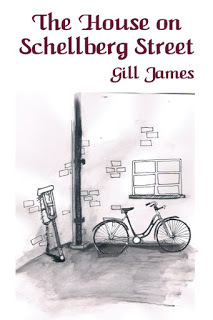
The House on Schellberg Street went out of print with Crooked Cat in early December 2017. I've now decided to self-publish it and all of the other Schellberg Cycle books. This is in part as the books also feed into a series of workshops and talks I am doing. Whilst I have full control of the texts I can publish excerpts as and when I like and I can sell them at advantageous prices to schools and other groups.
I have re-edited it. There were very few typos or other mistakes – Crooked Cat does a good editing job. However, language moves on and I move on as a writer. I gave it a very light touch.We've added a new cover. It is still in the style of the old one and is created by the same professional artist – my son! This makes it easy to see that it is a different edition. Copies of the older one are of course still available from second-hand sellers.
I've extended the glossary slightly. I've altered the blurb in the light of what I've learnt about marketing and this also affects the product description and the key words on Amazon. My main buzz expression in "Holocaust Education".
The second book in the cycle comes out at the end of March. It is called Clara's Story: a Holocaust Biography. It is the story of Clara Lehrs, my husband's great-grandmother. Big question: is she a Holocaust victim, survivor or resister? The text suggests that the answer isn't black or white. I've written it as a novel and indeed the actual writing sometimes does the research. There are huge gaps in her story – indeed in all of the Schellberg Cycle stories - and I only find answers by asking such questions as "What would Clara do in these circumstances?" "Why did Clara do that?" I find the answers through my writing. If you'd like to know more about the Schellberg Cycle, take a look at: The House on Schellberg Street web site.
Below is a link to the book.
Published on February 21, 2018 03:51
February 14, 2018
An interview with Roger Noons
Recently at Chapletown Books we published Roger's Slimline Tales, a delightful collection of very short stories. Roger is also a regular contributor to the CaféLit e-zine that I edit.
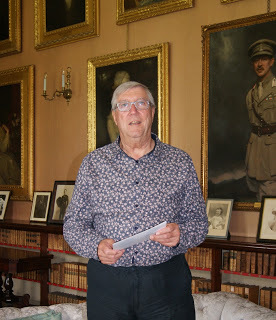 Performing poems at Laton Hall, Shropshire
Performing poems at Laton Hall, Shropshire What do you write and why?
Apart from a novel (I‘m too old to start and wouldn‘t want to spend all my time on one project,) I’ll have a go at anything. I’ve written a novella (still to be re-edited,) short stories, flash fiction, poems, plays, sketches, screenplays, memoirs, letters to newspapers, reports of meetings and events. You name it, I’ll take up the challenge. Since 2006 my principal output has been short stories and during the last eighteen months, flash. So far this year, I have two film scripts to develop and am trying to concentrate on poetry.I have always depended on a creative outlet to keep me sane. During the 35 years I worked in public health, it was photography. As my parents grew older, in order to provide support, I turned to drawing and painting. After my father died and Ma needed more of my time, it became writing.
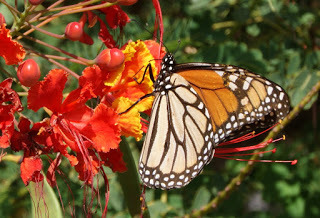 I still take the odd snap
I still take the odd snapGetting started
A friend took me to meet a film maker who had a small cinema in his house. After we’d watched some of his movies and enjoyed a couple of glasses of red, he told me his regular screenwriter was starting a novel and he was looking for someone else to script his ideas and come up with new ones. After another glass of Rioja I announced that it couldn’t be that difficult and I’d have a go. I did and my first screenplay was filmed during the following year.Soon after, I joined a writers group which had been set up for carers and did a creative writing course. I was off and running and writing became a passion, maybe even an addiction.
Routine
As far as possible, mornings are reserved for chores and appointments, afternoons for writing. When we are away from home, I spend every spare moment with pen and paper. I love it, a joy to be away from the keyboard and screen. When we are in Mallorca, I have my special pomegranate tree under which I sit and write while gazing at a 500 year old olive.
A pen and notebook are always within arms length, so that while waiting for an appointment for example, if I see or hear something or an idea occurs, notes are made.
Even when driving, I can be heard reciting, though much of that is never remembered and written down.
I have a number of pieces on the go at any one time. When one sticks, I turn to another. Sometimes a story will stall and I have pieces that have been in the folder for two years or more. When a first draft is complete, I will put it to one side for a week or two. Usually when I return, it will tell me what is needed to finish. The exception is flash which tends to be done in one go. Get the idea, write it down, tidy it up and close the file. Short pieces need that freshness which can often be lost if you leave, tinker with or tweak. Fellow WG members criticise this approach, but I tell them, I write for pleasure, (certainly not for money,) I’ll do it how I want to and when.
Working Space
Our third (smallest) bedroom is my office, studio, library and storage space, but I will and can write anywhere, providing there is not too much noise. I always used to draw and paint to a background of music, but that doesn’t work with writing. I’ve tried writing on bus journeys but that’s not easy. I’m not a great frequenter of cafes and bars, other than to eat, but if I find myself in a town with time to pass, I seek out the library which is a nice place to write.
Writer
I am a writer; it’s what I do and have called myself such ever since my first film script was ‘published,’ i.e. properly typed in the appropriate format and put into a ring binder to give to actors. It was soon afterwards that I had work in an anthology published by the Carers Writing Group, which I believed confirmed my status.
Support
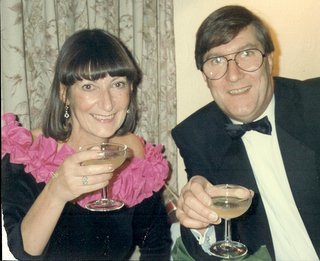 Roger and Judy
Roger and JudyMy wife, Judy was a public librarian for almost 40 years, so books are her thing. Since getting married in 1970, we have never owned a TV set, but the house is always overflowing with newspapers, books and magazines. Judy will have three novels on the go at any one time, but I can’t do that. She doesn’t read everything I write, as she has a habit of saying ‘very good.’ I study her expression and that’s what tells me what I need to know.
My mother used to tell everyone within earshot that I was a writer until; the Carers Writers Group produced an anthology featuring pieces by those who were being cared for. Mum had two pieces included and following that ‘til her death (aged 99) she became the ‘writer’ in the family.I’ve always been a member of a writers group, at the moment it’s two and generally speaking, apart from occasional jealousies, fellow members have been supportive.
Most Proud Moments
Not in any particular order :-
The first time I saw my name on a film credit and when I found myself mentioned on IMDB.When I had my one hundredth submission accepted for Café Lit.When, after performing a poem about trees in a church, a member of the congregation asked if she could have a copy to read at her daughter’s wedding.When I opened the package and for the first time saw a copy of Slimline Tales.
Editing and Research
I enjoy this part almost as much as getting down the first draft. I follow the advice to write the piece rather than edit as I go. Research, I do as I need it. When I first began writing I tended to do all the research at the beginning but then wanted to include everything I’d learned. You can tell when reading a book that an author has spent hours researching and they are jolly well going to put everything in the book. The only exception is when drafting a poem on a particular subject, for instance, at the moment I’m working on a poem about an element of the busting of the dams in Germany. It’s in the voice of a bomb aimer and I did a lot of research before I wrote the first line. I use the cluster approach for poems.
Future Goals
To live as long as I can, write as much as I can and enjoy it.
Inspired by :-
Robert Graves, William Boyd, Dylan Thomas, Gillian Clarke, Lee Child, Joanne Harris, John Irving, Alan Bennett, Robert Macfarlane, F G Lorca, Joan Miro and many more.
Published on February 14, 2018 07:42



